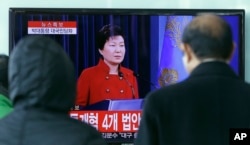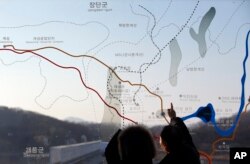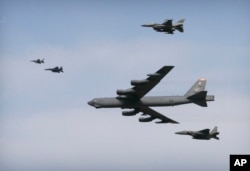Pyongyang’s defiant pursuit of nuclear weapons is forcing countries in northeast Asia to either support crippling sanctions or ultimately recognize North Korea as a nuclear state.
North Korea's most recent perceived provocation came Tuesday when it announced a plan to launch an "Earth observation satellite" sometime February 8-25.
Pyongyang maintains the rocket launch is part of its peaceful space program, but it has been widely denounced as a hostile pretense intended to circumvent a United Nations ban imposed on North Korea's nuclear and ballistic-missile programs.
Washington, Seoul and Tokyo have warned Pyongyang that it will face significant consequences if it goes forward with the planned launch.
South Korea’s hard line
In South Korea virtually all talk of peaceful engagement with the North ceased and exchanges were canceled after North Korea conducted its fourth nuclear test on January 6.
This week’s there are reports that Seoul will consider closing the Kaesong Industrial Complex if Pyongyang follows through with its planned rocket launch. The jointly run Kaesong project, which employs over 50,000 North Koreans, is the last surviving inter-Korean development program.
Virtually all other inter-Korean ties and assistance programs were severed in 2010 after South Korea accused the North of sinking a navy warship and killing 46 sailors.
President Park Geun-hye’s strong support for harsh international sanctions against the Kim Jong Un government has bolstered South Korea’s relationship with the United States.
But at the same time, it seems to have strained South Korea’s previously growing ties and friendship with China.
“(Chinese President) Xi Jinping has chosen not to communicate in a meaningful fashion with the government of the Republic of Korea, or with President Park Geun-hye, who he has closely cultivated over a period of time,” said Jonathan Pollack, an East Asia policy analyst with the Brookings Institution in Washington.
China’s predicament
China seems to be caught between opposing North Korea’s nuclear program and supporting its ally.
Beijing has been reluctant to support harsh sanctions and has called on all sides to resume international negotiations to work out a deal to dismantle the North’s nuclear weapons program in exchange for economic assistance and security guarantees.
However, Pyongyang’s hard-line position, that its nuclear weapons program is necessary for national defense and non-negotiable, leaves little room for a Beijing-engineered compromise.
By not supporting strong punitive measures, critics say, China is basically condoning North Korea’s behavior.
“By simply returning to the table, not really doing anything or imposing any consequences, real consequence on North Korea, then you have acquiesced and accepted them under that status,” said Daniel Pinkston, a lecturer in international relations with Troy University in Seoul.
There is also concern that U.S. or U.N. sanctions imposed on Pyongyang could actually inflict more collateral damage on China, because North Korea is already so isolated and economically dependent on its neighbor for fuel, trade and assistance.
Proposed restrictions on border trade as well as third parties that do business with North Korea could disproportionately target Chinese companies and banks.
“The more immediate implication is whether or not as a consequence of North Korea’s actions, the United States in collaboration with the ROK and prospectively with Japan, undertake strategic activities, security activities in Northeast Asia that impinge on China, even if they’re not intended to address China,” Pollack said.
More active role
North Korea’s increasing nuclear capability continues to be a key justification for Prime Minister Shinzo Abe’s efforts to push for a more assertive military role in the region and to justify easing restrictions placed upon its military by the country’s post World War Two pacifist constitution.
“If we have a consistent demonstration of success in an intermediate range ballistic missile, this will clearly raise the threshold, I think, for Tokyo in thinking about what needs to happen in terms of extended deterrent,” said Sheila Smith, a regional analyst at the Council on Foreign Relations.
After the recent North Korean nuclear test, Tokyo reaffirmed its strong alliance with Washington and its support for strong international sanctions.
In anticipation of a North missile launch, Japan has also put its ballistic-missile defense units on alert, including Aegis destroyers in the Sea of Japan and Patriot missile batteries onshore.








